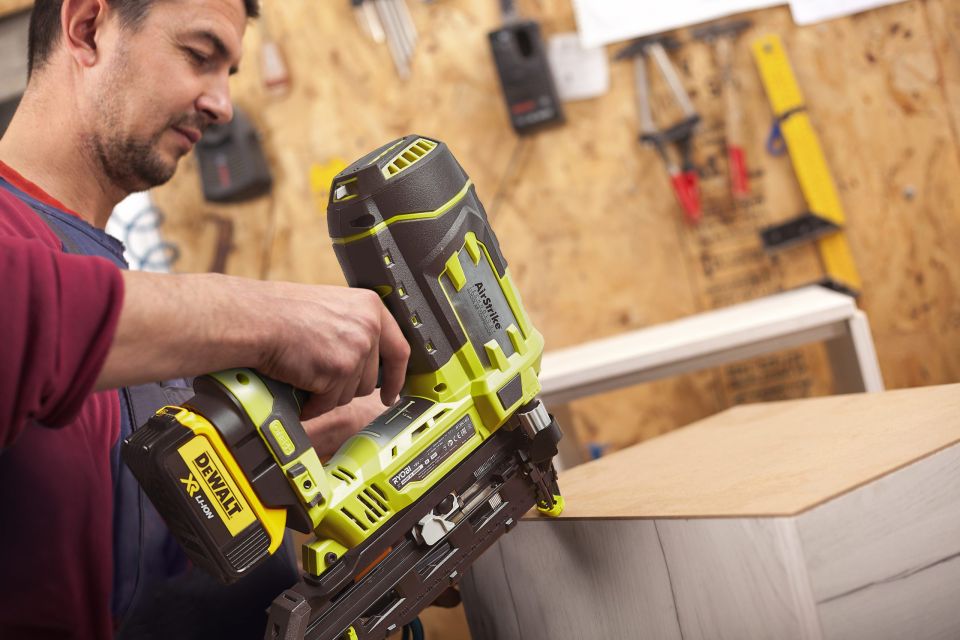YOUR CART
- No products in the cart.
Subtotal:
£0.00
BEST SELLING PRODUCTS
Free delivery on all orders to Mainland UK

Looking to buy a cordless nail gun and are unsure which one suits the job you’ve got lined up? Here’s what you need to know to get the right tool.
There are two types of cordless nail gun available: fuel/gas-powered and electric. Both require a rechargeable battery to operate but have different methods of driving nails.
Fuel-powered nail guns have a replaceable fuel canister that contains combustible gas. When the trigger is pulled, the battery sends a charge to the end of the gas canister, where a very small amount of the gas is released. The electrical charge from the battery will be converted into a spark, which ignites the gas, causing a small explosion. This drives a piston, forcing the nail into the material.
Battery-powered nail guns use electromagnetic energy to drive nails. Similar to modern brushless tools, which we covered in a previous blog, the battery creates an electromagnetic field around a coil known as a solenoid. Within this solenoid is a piston which is used to fire the nails. Once significant force has been generated by the solenoid, it forces the piston down, which drives the nail.
Most companies producing cordless nail guns are trying to move away from the gas-powered method, as this not only reduces tool weight, but also eliminates the additional cost of fuel cells needed to drive the nails.
The benefit of any cordless tool over a corded one is portability. Without the restriction of a cord, you can work anywhere without the worry of trip hazards or stretching and potentially snapping cables or hoses.
A pneumatic nail gun requires an air compressor in place of a regular power cable. Once switched on, they take time to pressurize before they can be used. With a cordless nail gun, the tool is ready to be used the moment it’s switched on, decreasing downtime.
Conventionally, pneumatic tools are more powerful than cordless tools due to the method of firing nails. This means that not all cordless tools can be used for all applications. More robust surfaces will require a pneumatic nail gun over a cordless one. Pneumatic tools can also run all day without any drop in efficiency or power. Cordless tools are reliant on a fully charged battery to operate at maximum efficiency.
A quick Google search for cordless nail guns will usually show up with two main types: brad nailers and finish nailers. Although there are many more variants available, these are the two most common types and are predominantly used by DIYers and handymen.
Brad nailers are used for light-duty fixings in wood where small nails are required to hold materials together along with a suitable adhesive. Most brad nailers use 18-gauge nails, which have very tiny heads that are almost invisible when driven into the wood.
For jobs that necessitate greater holding power, a finish nailer is required. These use 15 or 16-gauge nails, which are thicker and have larger heads than the 18-gauge nails. This does mean, however, that they tend to leave larger, more visible holes in the wood. It’s therefore a good idea to use the nails in areas that are less visible.
Outside of these options, there are nail guns specifically designed for certain jobs. These include framing nailers, roof nailers, pin nailers, flooring nailers, and even palm nailers for hard-to-reach areas. These are trade specialist tools which wouldn’t usually be required in DIY applications. For more information on the extended range of nail guns available, check out House Grails’ blog post.
Ryobi have recently extended their range of cordless nail guns to better suit the needs of their customers. They offer very cost-effective 16 and 18-gauge nail guns, and have recently released a 15-gauge gun for tougher applications. When compared to the offerings from DeWalt and Milwaukee, they are far cheaper, without compromising on quality or performance. In many cases, the Ryobi nail guns have outperformed their more expensive counterparts.
If you’re looking to expand your tool collection outside of your normal brand, with a Badaptor, there’s no need to purchase a new battery system and charger. A Badaptor will convert 18V DeWalt, Makita, Milwaukee, Bosch Professional, Ridgid, or AEG batteries to work with the entire range of Ryobi One+ tools.
Get yours today at badaptor.com
Sign up for our newsletter to receive product news.
Leave a Reply